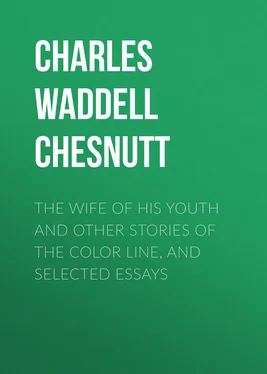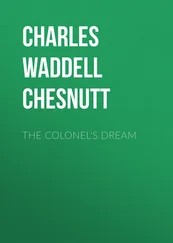Charles Waddell Chesnutt - The Wife of his Youth and Other Stories of the Color Line, and Selected Essays
Здесь есть возможность читать онлайн «Charles Waddell Chesnutt - The Wife of his Youth and Other Stories of the Color Line, and Selected Essays» — ознакомительный отрывок электронной книги совершенно бесплатно, а после прочтения отрывка купить полную версию. В некоторых случаях можно слушать аудио, скачать через торрент в формате fb2 и присутствует краткое содержание. Жанр: foreign_prose, foreign_antique, на английском языке. Описание произведения, (предисловие) а так же отзывы посетителей доступны на портале библиотеки ЛибКат.
- Название:The Wife of his Youth and Other Stories of the Color Line, and Selected Essays
- Автор:
- Жанр:
- Год:неизвестен
- ISBN:нет данных
- Рейтинг книги:5 / 5. Голосов: 1
-
Избранное:Добавить в избранное
- Отзывы:
-
Ваша оценка:
- 100
- 1
- 2
- 3
- 4
- 5
The Wife of his Youth and Other Stories of the Color Line, and Selected Essays: краткое содержание, описание и аннотация
Предлагаем к чтению аннотацию, описание, краткое содержание или предисловие (зависит от того, что написал сам автор книги «The Wife of his Youth and Other Stories of the Color Line, and Selected Essays»). Если вы не нашли необходимую информацию о книге — напишите в комментариях, мы постараемся отыскать её.
The Wife of his Youth and Other Stories of the Color Line, and Selected Essays — читать онлайн ознакомительный отрывок
Ниже представлен текст книги, разбитый по страницам. Система сохранения места последней прочитанной страницы, позволяет с удобством читать онлайн бесплатно книгу «The Wife of his Youth and Other Stories of the Color Line, and Selected Essays», без необходимости каждый раз заново искать на чём Вы остановились. Поставьте закладку, и сможете в любой момент перейти на страницу, на которой закончили чтение.
Интервал:
Закладка:
The nearest approach to town life afforded by Branson County is found in the little village of Troy, the county seat, a hamlet with a population of four or five hundred.
Ten years make little difference in the appearance of these remote Southern towns. If a railroad is built through one of them, it infuses some enterprise; the social corpse is galvanized by the fresh blood of civilization that pulses along the farthest ramifications of our great system of commercial highways. At the period of which I write, no railroad had come to Troy. If a traveler, accustomed to the bustling life of cities, could have ridden through Troy on a summer day, he might easily have fancied himself in a deserted village. Around him he would have seen weather-beaten houses, innocent of paint, the shingled roofs in many instances covered with a rich growth of moss. Here and there he would have met a razor-backed hog lazily rooting his way along the principal thoroughfare; and more than once he would probably have had to disturb the slumbers of some yellow dog, dozing away the hours in the ardent sunshine, and reluctantly yielding up his place in the middle of the dusty road.
On Saturdays the village presented a somewhat livelier appearance, and the shade trees around the court house square and along Front Street served as hitching-posts for a goodly number of horses and mules and stunted oxen, belonging to the farmer-folk who had come in to trade at the two or three local stores.
A murder was a rare event in Branson County. Every well-informed citizen could tell the number of homicides committed in the county for fifty years back, and whether the slayer, in any given instance, had escaped, either by flight or acquittal, or had suffered the penalty of the law. So, when it became known in Troy early one Friday morning in summer, about ten years after the war, that old Captain Walker, who had served in Mexico under Scott, and had left an arm on the field of Gettysburg, had been foully murdered during the night, there was intense excitement in the village. Business was practically suspended, and the citizens gathered in little groups to discuss the murder, and speculate upon the identity of the murderer. It transpired from testimony at the coroner's inquest, held during the morning, that a strange mulatto had been seen going in the direction of Captain Walker's house the night before, and had been met going away from Troy early Friday morning, by a farmer on his way to town. Other circumstances seemed to connect the stranger with the crime. The sheriff organized a posse to search for him, and early in the evening, when most of the citizens of Troy were at supper, the suspected man was brought in and lodged in the county jail.
By the following morning the news of the capture had spread to the farthest limits of the county. A much larger number of people than usual came to town that Saturday,—bearded men in straw hats and blue homespun shirts, and butternut trousers of great amplitude of material and vagueness of outline; women in homespun frocks and slat-bonnets, with faces as expressionless as the dreary sandhills which gave them a meagre sustenance.
The murder was almost the sole topic of conversation. A steady stream of curious observers visited the house of mourning, and gazed upon the rugged face of the old veteran, now stiff and cold in death; and more than one eye dropped a tear at the remembrance of the cheery smile, and the joke—sometimes superannuated, generally feeble, but always good-natured—with which the captain had been wont to greet his acquaintances. There was a growing sentiment of anger among these stern men, toward the murderer who had thus cut down their friend, and a strong feeling that ordinary justice was too slight a punishment for such a crime.
Toward noon there was an informal gathering of citizens in Dan Tyson's store.
"I hear it 'lowed that Square Kyahtah's too sick ter hol' co'te this evenin'," said one, "an' that the purlim'nary hearin' 'll haf ter go over 'tel nex' week."
A look of disappointment went round the crowd.
"Hit 's the durndes', meanes' murder ever committed in this caounty," said another, with moody emphasis.
"I s'pose the nigger 'lowed the Cap'n had some green-backs," observed a third speaker.
"The Cap'n," said another, with an air of superior information, "has left two bairls of Confedrit money, which he 'spected 'ud be good some day er nuther."
This statement gave rise to a discussion of the speculative value of Confederate money; but in a little while the conversation returned to the murder.
"Hangin' air too good fer the murderer," said one; "he oughter be burnt, stidier bein' hung."
There was an impressive pause at this point, during which a jug of moonlight whiskey went the round of the crowd.
"Well," said a round-shouldered farmer, who, in spite of his peaceable expression and faded gray eye, was known to have been one of the most daring followers of a rebel guerrilla chieftain, "what air yer gwine ter do about it? Ef you fellers air gwine ter set down an' let a wuthless nigger kill the bes' white man in Branson, an' not say nuthin' ner do nuthin', I 'll move outen the caounty."
This speech gave tone and direction to the rest of the conversation. Whether the fear of losing the round-shouldered farmer operated to bring about the result or not is immaterial to this narrative; but, at all events, the crowd decided to lynch the negro. They agreed that this was the least that could be done to avenge the death of their murdered friend, and that it was a becoming way in which to honor his memory. They had some vague notions of the majesty of the law and the rights of the citizen, but in the passion of the moment these sunk into oblivion; a white man had been killed by a negro.
"The Cap'n was an ole sodger," said one of his friends solemnly. "He 'll sleep better when he knows that a co'te-martial has be'n hilt an' jestice done."
By agreement the lynchers were to meet at Tyson's store at five o'clock in the afternoon, and proceed thence to the jail, which was situated down the Lumberton Dirt Road (as the old turnpike antedating the plank-road was called), about half a mile south of the court-house. When the preliminaries of the lynching had been arranged, and a committee appointed to manage the affair, the crowd dispersed, some to go to their dinners, and some to secure recruits for the lynching party.
It was twenty minutes to five o'clock, when an excited negro, panting and perspiring, rushed up to the back door of Sheriff Campbell's dwelling, which stood at a little distance from the jail and somewhat farther than the latter building from the court-house. A turbaned colored woman came to the door in response to the negro's knock.
"Hoddy, Sis' Nance."
"Hoddy, Brer Sam."
"Is de shurff in," inquired the negro.
"Yas, Brer Sam, he 's eatin' his dinner," was the answer.
"Will yer ax 'im ter step ter de do' a minute, Sis' Nance?"
The woman went into the dining-room, and a moment later the sheriff came to the door. He was a tall, muscular man, of a ruddier complexion than is usual among Southerners. A pair of keen, deep-set gray eyes looked out from under bushy eyebrows, and about his mouth was a masterful expression, which a full beard, once sandy in color, but now profusely sprinkled with gray, could not entirely conceal. The day was hot; the sheriff had discarded his coat and vest, and had his white shirt open at the throat.
"What do you want, Sam?" he inquired of the negro, who stood hat in hand, wiping the moisture from his face with a ragged shirt-sleeve.
"Shurff, dey gwine ter hang de pris'ner w'at 's lock' up in de jail. Dey 're comin' dis a-way now. I wuz layin' down on a sack er corn down at de sto', behine a pile er flour-bairls, w'en I hearn Doc' Cain en Kunnel Wright talkin' erbout it. I slip' outen de back do', en run here as fas' as I could. I hearn you say down ter de sto' once't dat you would n't let nobody take a pris'ner 'way fum you widout walkin' over yo' dead body, en I thought I 'd let you know 'fo' dey come, so yer could pertec' de pris'ner."
Читать дальшеИнтервал:
Закладка:
Похожие книги на «The Wife of his Youth and Other Stories of the Color Line, and Selected Essays»
Представляем Вашему вниманию похожие книги на «The Wife of his Youth and Other Stories of the Color Line, and Selected Essays» списком для выбора. Мы отобрали схожую по названию и смыслу литературу в надежде предоставить читателям больше вариантов отыскать новые, интересные, ещё непрочитанные произведения.
Обсуждение, отзывы о книге «The Wife of his Youth and Other Stories of the Color Line, and Selected Essays» и просто собственные мнения читателей. Оставьте ваши комментарии, напишите, что Вы думаете о произведении, его смысле или главных героях. Укажите что конкретно понравилось, а что нет, и почему Вы так считаете.












